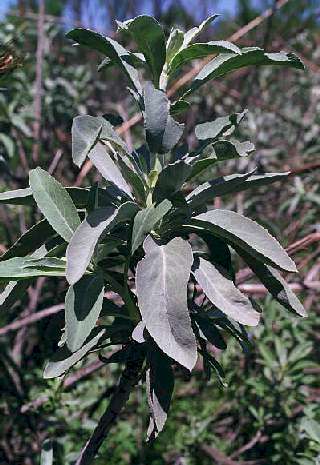KASILI ___________ Kasili is one of the most important plants in Tongva culture. While it is generally well known that various Native American cultures have spiritual uses for sage, the Tongva specifically consider kasili, or white sage, a "prayer plant." Kasili has many strictly medicinal uses as well. However, many of the uses of kasili are considered to be both medicinal and spiritual simultaneously. These uses reflect the central role the plant occupies within Tongva culture.As a medicine, the Tongva use kasili as a general cleanser or tonic. For bronchial problems, they make a mild tea from the leaves. The leaves may also be smoked to treat colds and they can be applied to the body as hair wash, hair dye, and hair straightener. They are also rubbed onto the body as a deodorant. The Tongva grind one seed for use as an eyewash or eye anti-inflammatory agent. Also, after Tongva women have given birth, drinking a kasili root decoction promotes overall healing. Kasili is also used to cleanse the blood from a poison oak infectionó the Tongva drink a decoction made of two leaves per "cup" of water to rid the bloodstream of the poison. The Tongva also grind the kasili leaves and eat them in porridge and bread. In fact, kasili seeds can be used to thicken flour. The leaves themselves are also eaten, as well as the tender stems of the plant. Other non-medicinal uses of kasili in Tongva culture reflect how the plant can simultaneously be defined as both medicinal and spiritual in its use. The Tongva gather bundles of kasili, dry them, and use them for "purification" ceremonies, spiritual cleansing, "smudging," blessing ceremonies, and to focus on spiritual or serious matters concerning both the individual and the community. They also smoke dried kasili leaves, together with native tobacco. They hang bundles of kasili leaves in the sweathouse, and the same bundles are used for "smudging" clothes, houses, or instruments. Moreover, kasili disperses bad luck, as when a menstruating woman accidentally touches the equipment that a man uses to hunt. Additionally, the Tongva apply kasili to the body before hunting in order to hide "human" smells that might ward off the animals being hunted. According to Tongva legend, kasili must be respected and venerated when found: "the one laying down are very old, we call it grandmothers and we are very respectful of themó when we find one we give thanks." |
|
